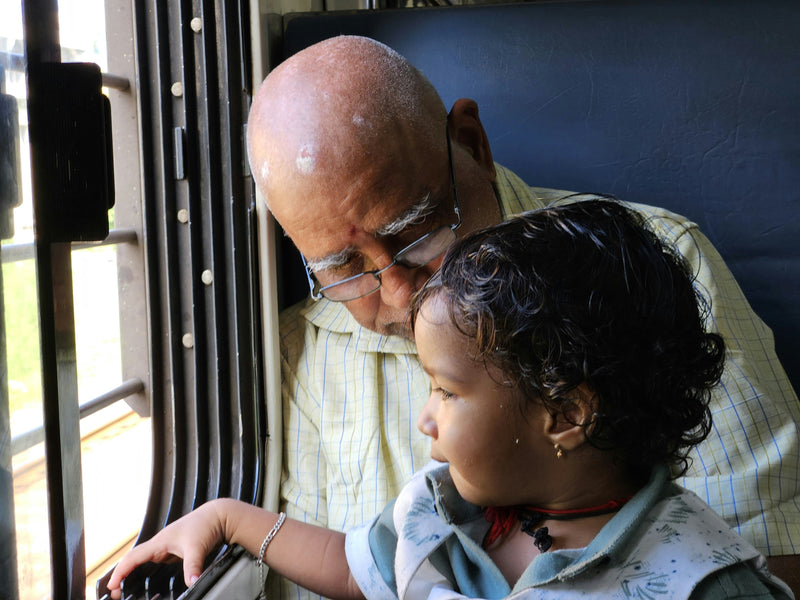
Bridge Builders: How Children Can Cultivate Beautiful Relationships with Elderly Loved Ones 👧👴🌉
Picture this: A six-year-old sits cross-legged on the living room floor, eyes wide with wonder as Grandpa recounts his childhood adventures. She's heard this story before—about the time he built a treehouse with nothing but scraps and determination—but she hangs on every word like it's the first telling. Later, she carefully helps him organize his old photographs, tiny fingers gentle with the precious memories. This isn't just a sweet moment—it's the foundation of a relationship that will enrich both their lives in ways that ripple through generations. 👵💕✨
The Magic of Intergenerational Bonds: More Than Just Family Time 🌟🤝
In our fast-paced, digital world, the deep connections between children and elderly family members can feel like a lost art. Yet research reveals that these relationships offer extraordinary benefits that extend far beyond simple family bonding:
For Children:
- Enhanced emotional intelligence and empathy 💝🧠
- Improved patience and listening skills 👂⏰
- Greater understanding of history and family heritage 📚🏛️
- Increased respect for wisdom and life experience 🎓👑
- Development of caretaking and nurturing abilities 🤲❤️
- Protection against ageism and stereotypes about aging 🛡️🌈
For Elderly Loved Ones:
- Reduced feelings of loneliness and isolation 🤗☀️
- Increased sense of purpose and value 🎯💪
- Mental stimulation and cognitive engagement 🧩💭
- Physical activity through play and interaction 🎾🚶♀️
- Joy and laughter that boost overall wellbeing 😄🎈
- Legacy sharing and storytelling opportunities 📖🎭
The Kindness Mindset Journal provides wonderful prompts for children to reflect on their feelings and how to be kind. 📔💕
The Values We Learn: Life Lessons from Our Elders 🌱📜
Elderly family members are living libraries of values, wisdom, and life lessons that can't be found in any textbook. When children cultivate relationships with their grandparents and other elderly loved ones, they absorb essential values:
Patience and Mindfulness 🕰️🧘♀️
Elderly loved ones often move at a different pace, teaching children the beauty of slowing down, being present, and savoring moments rather than rushing through life.
Resilience and Perspective 💪🌈
Having lived through decades of challenges, elderly family members model how to weather life's storms with grace, humor, and strength.
Gratitude and Simplicity 🙏✨
Many elders learned to appreciate simple pleasures and find joy in everyday moments—lessons that can ground children in our material-focused world.
Respect and Reverence 🙇♀️👑
Learning to honor the experiences and contributions of older generations builds character and teaches children to value wisdom over youth culture.
Unconditional Love 💝🤗
Grandparents often provide a special kind of love—one that's patient, accepting, and free from the daily pressures of parenting.
The stories in the My Furry Soulmates series beautifully model intergenerational relationships through animal characters who show respect and care. 📚🦝
Understanding Different Needs: Age-Sensitive Relationship Building 👀💡
Building meaningful relationships with elderly loved ones requires understanding their unique needs and challenges:
Physical Considerations 🏥🤲
- Speaking clearly and at appropriate volume levels 🗣️📢
- Moving at a comfortable pace during activities 🚶♀️⏰
- Offering gentle assistance without taking away independence 🤝⚖️
- Being patient with mobility limitations 🛏️💙
- Understanding medication schedules and energy levels 💊📅
Emotional Needs 💝🎭
- Feeling valued and respected for their contributions 🏆👍
- Having their stories heard and remembered 👂📚
- Maintaining dignity and autonomy 👑🗽
- Experiencing joy and laughter regularly 😊🎈
- Feeling connected to family traditions and legacy 🏠🌳
Cognitive Considerations 🧠💭
- Adjusting expectations for memory challenges 🧩❤️
- Focusing on emotional connection over perfect recall 💕🌟
- Using visual aids and familiar objects to support communication 🖼️🗣️
- Celebrating what they can do rather than focusing on limitations ✅🎉
The Confident Mindset Journal helps children develop the empathy, understanding and confidence. 📝🤗
Practical Bridge-Building: Activities That Connect Generations 🌉🎨
Creating meaningful connections doesn't require elaborate plans—some of the most powerful bonding happens through simple, intentional activities:
Story Sharing and Legacy Projects 📖🎭
- Record family stories and histories together 🎤📚
- Create photo albums or scrapbooks of family memories 📸📔
- Interview elderly relatives about their childhood and life experiences 🎙️👥
- Write down family recipes and cooking traditions 👩🍳📝
- Document family tree and genealogy projects 🌳👨👩👧👦
Creative Collaborations 🎨🧶
- Work on crafts or hobbies together (knitting, painting, gardening) 🧵🌻
- Create art projects that blend old and new techniques 🖌️✨
- Build puzzles or play board games 🧩🎲
- Sing songs from different eras 🎵🎤
- Learn traditional skills like sewing, woodworking, or cooking 🪡🔨
Technology Bridges 💻📱
- Teach elderly relatives how to use tablets or smartphones 📱👩🏫
- Help them connect with distant family through video calls 💻👋
- Share digital photo albums and social media updates 📷📊
- Play simple computer games together 🎮🕹️
- Watch favorite movies or shows from their era 📺🍿
Service Projects 🤝💝
- Volunteer together at community organizations 👥🏠
- Read to each other (children can read simple books, elders can share classics) 📚👂
- Garden together and share the harvest 🌱🥕
- Participate in church or community activities as a team ⛪👫
- Help with simple household tasks while spending quality time 🏠🧹
The Curiosity Mindset Journal encourages children to ask thoughtful questions about their elderly relatives' lives, fostering deeper understanding and connection. 🔍❓
Teaching Values Through Action: Modeling Elder Care 👨👩👧👦💝
Children learn more from what they see than what they're told. When we model respectful, loving care for elderly family members, we teach powerful values:
Showing Respect in Daily Interactions 🙏💫
- Address elderly relatives with appropriate titles and courtesy 👋🎩
- Listen attentively when they speak, even if stories are repetitive 👂💕
- Ask for their opinions and advice on family matters 🤔💬
- Include them in family decisions and celebrations 🎉👥
- Acknowledge their contributions and express gratitude regularly 🙌💝
Demonstrating Practical Kindness 🤲🌟
- Help with tasks that become difficult (opening jars, reading small print) 🫙👓
- Remember important dates like birthdays and anniversaries 🎂📅
- Check in regularly through calls or visits 📞🏠
- Bring small gifts or treats that show thoughtfulness 🎁🍪
- Offer assistance without waiting to be asked 💪❤️
Building Emotional Connections 💕🤗
- Share daily life updates and include them in ongoing family stories 📱💬
- Ask about their feelings and validate their emotions 💭🤗
- Create new traditions that honor both old and new preferences 🎊🌱
- Take photos together and display them prominently 📸🖼️
- Express love and appreciation openly and frequently 💕🗣️
The structured activities in the Kindness Mindset Journal help children reflect on acts of kindness and develop deeper appreciation for people in their lives. 📔🌱
Overcoming Common Challenges: When Relationships Feel Difficult 🌊💪
Not all intergenerational relationships flow smoothly. Children might face challenges that require guidance and patience:
When Elderly Relatives Seem "Different" 🤔💭
- Explain normal aging changes in age-appropriate ways 🧠📚
- Focus on the person's unchanged core identity and love ❤️🌟
- Help children find new ways to connect despite changes 🔄🤝
- Model acceptance and patience in your own interactions 😌🙏
- Celebrate small moments of connection and recognition ✨🎉
Managing Emotional Challenges 😢💙
- Acknowledge children's feelings about illness or memory loss 💭🤗
- Provide honest, age-appropriate explanations about aging 📖👶
- Help children focus on giving love rather than receiving recognition 💕➡️
- Create memory books for children to remember good times 📚💝
- Seek professional support when grief or confusion becomes overwhelming 🆘👨⚕️
Technology and Communication Gaps 📱👴
- Teach children to communicate without relying on technology 🗣️❌📱
- Practice patience with different communication styles 🕰️💬
- Find common interests that transcend generational differences 🎯🤝
- Help elderly relatives learn new communication methods gradually 📚🐌
- Focus on emotional connection over perfect communication 💕🌈
The Confident Mindset Journal provides tools for children to process challenging emotions and maintain connection even during difficult times. 📝💪
The Ripple Effect: How Elder Relationships Shape Society 🌊🌍
When children develop strong relationships with elderly family members, the benefits extend far beyond individual families:
Building Compassionate Communities 🏘️❤️
Children who learn to value elderly people become adults who support age-friendly policies, communities, and practices.
Preserving Cultural Heritage 🏛️📚
Intergenerational relationships keep traditions, stories, and cultural knowledge alive for future generations.
Reducing Ageism 🚫👴
Early positive experiences with elderly people help children develop lifelong respect for aging and older adults.
Creating Support Networks 🕸️🤝
Families with strong intergenerational bonds create natural support systems that benefit everyone during challenges.
Modeling Caregiving Values 👨👩👧👦💝
Children who see elder care modeled learn to value caregiving as a family and community responsibility.
By using tools like the Confident Mindset Journal, Curiosity Mindset Journal, Kindness Mindset Journal, and the stories in the My Furry Soulmates series, we provide children with scaffolding to build meaningful intergenerational relationships during their most formative years. 📚🧱
Starting Today: Simple Steps for Building Elder Connections 👣💕
Building stronger relationships with elderly family members doesn't require dramatic changes. Start with these simple approaches:
- Schedule regular connection time - even 15 minutes weekly makes a difference 📅⏰
- Ask about their childhood - children love hearing about "when you were little" 👶📚
- Teach them something new - let children share their interests and skills 🎨🏆
- Create photo sharing rituals - look through old albums together regularly 📸👀
- Practice active listening - encourage children to really hear their stories 👂💝
- Start a family history project - document stories, recipes, or traditions together 📖🌳
- Use journaling with the Kindness Mindset Journal to help children reflect on their relationships with loved ones 📝
Join Our Intergenerational Love Conversation! 💬🌟
How have the elderly people in your children's lives enriched their development? What traditions or values have been passed down through your family? Share your intergenerational stories in the comments below!
Remember: When we help children cultivate relationships with elderly loved ones, we're not just creating sweet family moments—we're building bridges across generations that strengthen our entire society. These relationships teach children that wisdom comes with age, that every person has value regardless of their abilities, and that caring for our elders is both a privilege and a responsibility. In a world that often prioritizes youth and independence, there may be no greater gift we can give our children than the knowledge that they are part of something bigger—a family story that spans generations and a community that values every chapter of life. ✨🌟👨👩👧👦



0 comments